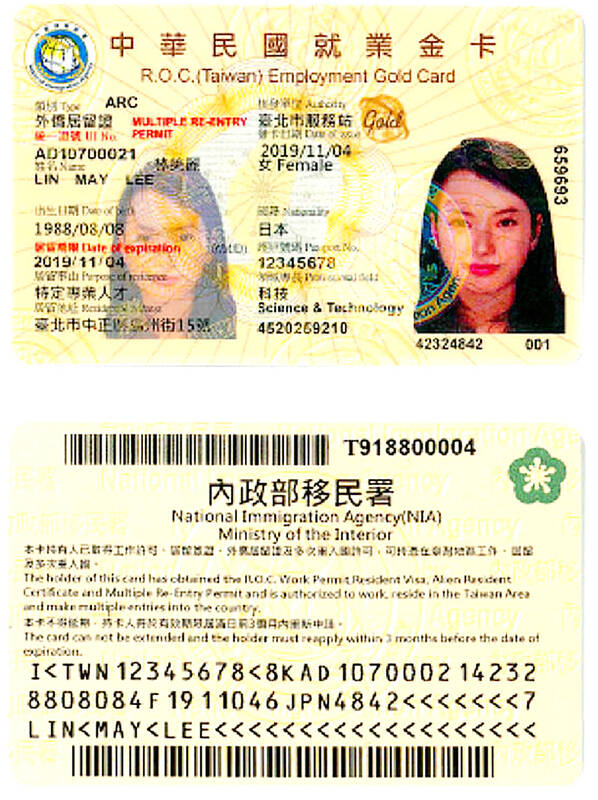More than 200 people with high-level expertise in the digital industry last year secured the Employment Gold Card, with about 60 percent working in software development jobs, data from National Development Council and Administration for Digital Industries showed.
Launched in 2018, the card combines the functions of a resident visa, work permit, Alien Resident Certificate and re-entry permit, and allows foreign professionals to leave and re-enter Taiwan multiple times over the course of one to three years.
Foreigners are eligible to apply for gold cards if they have expertise in science, technology, economy, education, culture, arts, sports, finance, law, architecture, national defense or digital industries.

Photo courtesy of the National Development Council
The qualifications of foreign professionals would be assessed by government officials regulating these industries, and applicants are not required to receive job offers to apply for gold cards.
Those who do not have expertise in the listed categories might still be qualified for gold cards as special cases, depending on the National Development Council consultation with government officials. Foreign professionals with specialized knowledge and skills in digital industries were not qualified for employment gold cards until the middle of last year.
Applicants must meet one of the following requirements: having at least eight years of relevant professional experience in digital economy-related industries, having held positions in a digital economy-related industry in Taiwan or other countries with a most recent monthly salary of at least NT$160,000, or having graduated with a doctorate from one of the top 500 universities listed in the most recent QS World University Rankings, Times Higher Education World University Rankings or US News and World Report Rankings.
Meanwhile, those with expertise in the products or services required in the digital economy-related industries can also apply if they have obtained a doctoral degree in related fields at a domestic or foreign university, and if they received domestic or foreign awards recognized by the Ministry of Digital Affairs, or had more than four years of work experience in related fields.
As of December last year, 216 foreigners secured employment gold cards because of high-level expertise in the digital industry, which accounted for 2.4 percent of the gold cards issued since 2018.
The Administration for Digital Ministries of the Ministry of Digital Affairs is in charge of reviewing gold card applicants working in the digital industry. As of January, the administration had received 420 applications, 298 of which met the requirement for a gold card, administration data showed.
The expertise of the applicants varies from software development, computer programming, e-commerce and video gaming to cybersecurity, the administration said, adding that about 60 percent of applicants are working in software development-related fields.
Applicants who secured gold cards are mainly developers of software, digital content and video games, the administration added.
Seventy percent of the applicants from the digital industries are 39 years of age or younger, the administration said.
Aside from Employment Gold Cards, the administration is offering subsidies on flight tickets as incentives to attract talent in the digital economy field, it said, adding that the application deadline for subsidies is the end of October.

A preclearance service to facilitate entry for people traveling to select airports in Japan would be available from Thursday next week to Feb. 25 at Taiwan Taoyuan International Airport, Taoyuan International Airport Corp (TIAC) said on Tuesday. The service was first made available to Taiwanese travelers throughout the winter vacation of 2024 and during the Lunar New Year holiday. In addition to flights to the Japanese cities of Hakodate, Asahikawa, Akita, Sendai, Niigata, Okayama, Takamatsu, Kumamoto and Kagoshima, the service would be available to travelers to Kobe and Oita. The service can be accessed by passengers of 15 flight routes operated by

MORE FALL: An investigation into one of Xi’s key cronies, part of a broader ‘anti-corruption’ drive, indicates that he might have a deep distrust in the military, an expert said China’s latest military purge underscores systemic risks in its shift from collective leadership to sole rule under Chinese President Xi Jinping (習近平), and could disrupt its chain of command and military capabilities, a national security official said yesterday. If decisionmaking within the Chinese Communist Party has become “irrational” under one-man rule, the Taiwan Strait and the regional situation must be approached with extreme caution, given unforeseen risks, they added. The anonymous official made the remarks as China’s Central Military Commission Vice Chairman Zhang Youxia (張又俠) and Joint Staff Department Chief of Staff Liu Zhenli (劉振立) were reportedly being investigated for suspected “serious

ENHANCING EFFICIENCY: The apron can accommodate 16 airplanes overnight at Taoyuan airport while work on the third runway continues, the transport minister said A new temporary overnight parking apron at Taiwan Taoyuan International Airport is to start operating on Friday next week to boost operational efficiency while the third runway is being constructed, the Ministry of Transportation and Communications said yesterday. The apron — one of the crucial projects in the construction of the third runway — can accommodate 16 aircraft overnight at the nation’s largest international airport, Minister of Transportation and Communications Chen Shih-kai (陳世凱) told reporters while inspecting the new facility yesterday morning. Aside from providing the airport operator with greater flexibility in aircraft parking during the third runway construction,

American climber Alex Honnold is to attempt a free climb of Taipei 101 today at 9am, with traffic closures around the skyscraper. To accommodate the climb attempt and filming, the Taipei Department of Transportation said traffic controls would be enforced around the Taipei 101 area. If weather conditions delay the climb, the restrictions would be pushed back to tomorrow. Traffic controls would be in place today from 7am to 11am around the Taipei 101 area, the department said. Songzhi Road would be fully closed in both directions between Songlian Road and Xinyi Road Sec 5, it said, adding that bidirectional traffic controls would